
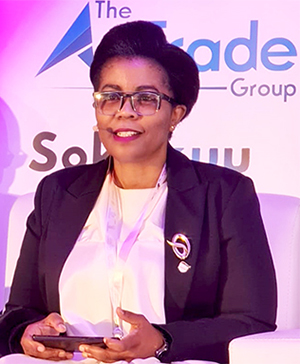
Prof Puleng LenkaBula, Unisa Principal and Vice-Chancellor
"An environment of economic success cannot be enabled if there are no African languages." These are the words of Unisa’s Principal and Vice-Chancellor, Prof Puleng LenkaBula, speaking at the Intra-African Trade Forum African Union Youth Start Up on 19 November 2021. The event brought together youth start-ups from across the continent, to co-exhibit their products and services.
At the event, Prof Puleng LenkaBula participated in a panel discussion, together with the KwaZulu-Natal MEC for Education, Mr Kwazi Mshengu. The session was entitled Building bridges across Africa with education, and the focus was on African leadership, education, economy and business. She took the opportunity to encourage young people to harness African languages in their business ideas and plans. She also urged young people to never seek opportunities based on association and favours, but to rely on their skills and good ethics.
In her address, LenkaBula remarked: "You don't just become a Vice-Chancellor and Principal because you are a woman, you become one because of your expertise." Giving career and professional context to her talk, Prof LenkaBula explained to the audience that during the course of her career, and in various capacities, she had to teach, supervise students and publish academic work, and these experiences capacitated her to be appointed as Vice-Chancellor at the university.
"As a woman, I was trained to understand that education is what will liberate me – not any association with anyone. Therefore, work hard and look at education as that reason for optimising yourselves in life. I had to demonstrate my competencies, initiatives and agility, as well as the multiplicity of my experiences, within the local context, across the continent and in the global arena. I was also a leading think-tank in the global arena around issues that concern women and social science research in Africa," said LenkaBula, advocating towards a better future for young Africans.
Regarding the university’s vision of sustaining Africa’s development through education, Prof LenkaBula reflected on this undertaking as follows: "This is important to Unisa, as we are unapologetic about advancing Africa’s intellectuals, knowledge systems, civilisations and inventive contributions to the global knowledge and trading systems." In addition, she reiterated that the university is committed to ensuring that aspects around an integrative, prosperous and peaceful Africa are not just dreams, but an active experience for Unisa’s students and researchers, and those who would like to associate with the university.
"We are responsible for four-hundred thousand students. We have tenfold the number of students compared to some of the universities in our country." ~ VC
"We are therefore a complex university. We are a site of success and excellence as a university, because we are not just operating in South Africa. In Ethiopia, we set up a campus and we are at the centre of resourcing its intellectual trajectories," said LenkaBula, confirming the complexity and size of the university. "Some of the key catalytic niche areas that the university assess, which is quite important to analysing economic success for the continent, are allocated within decolonial knowledge systems – the idea is that Africans must be at the centre of shaping knowledge products, commitments with partnerships within and outside the continent."
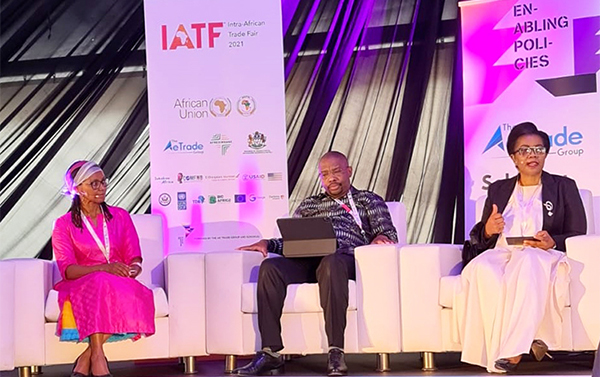
A panel discussion between Unisa's VC, Prof Puleng LenkaBula (right) and KwaZulu-Natal MEC for Education, Kwazi Mshengu (middle), facilitated by Treasure Maphanga, Ae Trade Group CEO (left).
Presenting key aspects that African youth should explore, Prof LenkaBula mentioned the space of marine science and energy – indicating that there are untapped opportunities in these spaces for new innovators, inventors and entrepreneurs. She further pleaded with young Africans to not disregard the aviation or the motor industries, as issues around these industries are quite integral. Prof LenkaBula believes that universities are social institutions that must be at the forefront of resourcing political and economic systems and in advancing science diplomacy.
Furthermore, LenkaBula criticised the use of social media for entertainment purposes only. "Entertainment is important, but youth must utilise social media systems to ensure that their businesses, entrepreneurial activities or inventions find expression in those spaces, to shape the businesses they want." She said that young people should use the various available platforms to make their voices heard and showcase their business activities. She noted: "Ensure that your businesses are intertwined with the economic system, such that predators don’t take advantage of your invention."
Concerning global trading systems, Prof LenkaBula asked young people to participate in party politics, because that is where structural decisions on how countries operate are made. "When young people say, 'I am not going to vote, politicians are corrupt', you are actually leaving your own life in the hands of those who will take those decisions." She said a good trading system, whether in Africa or Europe, or anywhere on the globe, will not be successful if young people do not participate in these systems, which structurally form the country.
LenkaBula also emphasised the importance of analysing the national budget and the priorities of the African Union. In this regard, she implored young people to influence it through their knowledge and their business enterprises, but also through their ideas, while "prioritising on how Africa is harnessing and developing herself". She added: "If you don’t participate, you will allow the older generation to determine your trajectories. Civil participation, that moral agency, is important; hence, we believe, as a university, that economic success should be allocated within decolonial knowledge systems."
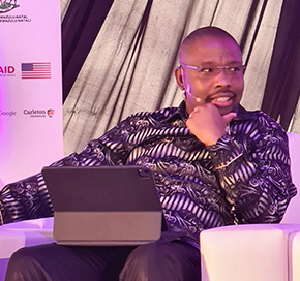
Kwazi Mshengu, KZN MEC for Education
Delivering his address, Kwazi Mshengu shared with young people the importance of ensuring that their voices are heard in the political space. He stated that young people should not hesitate to voice their opinions. "You should make it impossible not to be heard," he said. Mr Mshengu told the youth in Africa to know their African history, as products of the struggle. His aspiration is to see young people succeed in building the Africa they want. In particular, they should have the depth and knowledge of self, to succeed in the business sphere. "Young people in Africa must find their role, where our leaders left off."
In the "Meet the Leader" sessions, which was part of the other platforms, Prof LenkaBula gave powerful and profound inputs regarding the project of African intellectuality and its contribution to paving the way to emancipating the continent, its leadership, the economy and business.
During the sessions, Prof LenkaBula also spoke to Ubuntu Radio, and interacted with industry peers and high-level stakeholders such as the three AfriExim Bank directors – Dr Hippolyte Fofack, Director of Research and International Cooperation; Mr Stephen Kauma, Director of Human Resources; and Dr Antony Coleman, Principal Economist – to ensure that the future of Unisa, as an African university, as well as its students, is sustained.
* By Lesego Chiloane-Ravhudzulo, Journalist, Department of Institutional Advancement
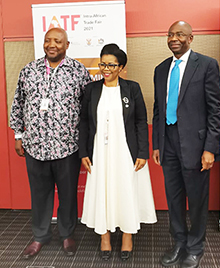 |
 |
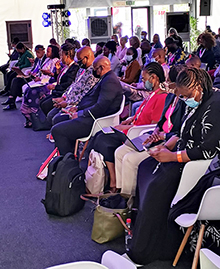 |
Publish date: 2021-11-26 00:00:00.0